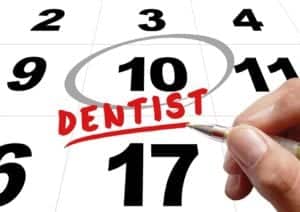
Even though your dental hygiene is important to you, going to the dentist might be something you regularly avoid. If this is you, there is no need to worry or be ashamed, you are not alone; 9% to 15% of Americans say they avoid going to the dentist due to fear.
Those with dental phobias have a sense of uneasiness when it comes to meeting dental appointments.
What is a dental phobia?
Dental phobia is the anxiety or fears a person feels at the thought of visiting the dentist’s office. This includes;
- Fear of pain: This is usually due to an earlier painful experience from a dental appointment or from what a person has heard.
- Fear of the drill: The sound the drill makes might make one to anticipate more pain.
- Fear of injection: 1 in 5 people have a fear of needles and injections, let alone an injection in the mouth. Some might doubt the effectiveness of the anesthesia received, which further increases their anxiety levels.
- Fear of anesthesia side effects: A person might be afraid of experiencing the possible side effects of anesthesia.
- Loss of personal space: One might feel self-conscious about their teeth’s condition or might feel uncomfortable due to the dentist being so close to their face.
Symptoms of dental phobias
If you experience some of these signs and symptoms every time the topic of the dental exam is on your mind, then you might have dental phobia;
- Difficulty sleeping the night before a dentist appointment
- Getting nervous especially while in the dentist’s office waiting room
- Intense uneasiness and difficulty breathing when in a dentist’s office or during the dental exam
- Extreme discomfort during dental procedures
- Being unable to enter the dentist’s office
If you haven’t been to the dentist in years – that may be a good sign that you are avoiding either injection, pain, or feel too vulnerable opening up to a dentist.
While the fear and anxiety you experience during a dental exam are reasonable and understandable, it might help to know that advancements are being made in dentistry; in terms of technology, procedures, and training. These advancements have made most of the modern day’s dental procedures less painful than they used to be, and some are often not painful at all.
There is even more good news! There are ways to manage your dental phobia so as not to let it stop you from having those straight and white teeth we all desire.
Managing dental phobias
- Start by identifying your fear. Is it the needle, the drill, the pain, the anesthesia, or all the above?
- It is also important to choose the right dentist for you. Choose one who is caring, professional, listens to your concerns, and is okay with explaining some of the procedures to you.
- Be open to your dentist about your fears. If you are afraid of the pain, letting them know will have them administer anesthesia in a way that will make you comfortable; maybe through applying numbing gel. Laughing gas can also be used to relax you.
- You could have a friend or family member accompany you.
- Visualization and deep breathing techniques can also help calm you and lower your anxiety.
- Your fear of the drill can be taken care of by putting on earphones and listening to music, podcast, or a soothing narration. Your teeth and gums will already be numb, so you might feel the vibrations, but there will be no pain.
- You might be feeling uneasy or embarrassed about the state of your teeth. Try not to let this worry you. Dentists deal with damaged gums and teeth daily, and chances are they have seen teeth in much worse condition than yours. If you are embarrassed, let your dentist know; they will be ready to comfort your worries.
Don’t let your phobias get in the way of your dental hygiene, or stop you from getting that winning smile. Talk to your dentist. If you don’t have a dentist, call a few and see which ones you feel most comfortable with. And if you happen to live in the Boulder, Colorado area – give us a call.
